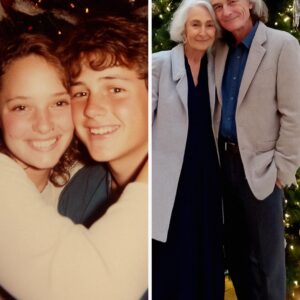Carl caught a biker stealing flowers from graves at the cemetery where he worked. He confronted the man, ready to call the police, until the biker asked for just two minutes and led him to a small, neglected child’s grave. It belonged to his daughter, Emily, who had died 32 years earlier in a car accident—an accident he caused. He told Carl he visited every single Sunday but could never afford flowers on his disability income, so he took only a few from graves with plenty, just to make sure Emily’s grave looked loved.
Carl realized the man wasn’t a criminal—just a grieving father who never stopped showing up. Instead of calling the police, Carl promised he would bring flowers every Sunday so Emily would always have something beautiful. And he did, week after week.
Over time, their small act of kindness grew. The biker’s nephew planted bushes at Emily’s grave. When the biker had a heart attack, he sent Carl the little money he’d saved to repay him; Carl used it to buy a bench so the father could sit when visiting. Soon, other bikers from the veteran’s motorcycle club joined in, caring for the forgotten graves around Emily’s too. They cleaned headstones, pulled weeds, and placed flowers on graves that had long been abandoned.
What started with one man trying to stop a thief became a group of bikers tending cemeteries and honoring strangers. Emily’s grave is always cared for now, always holding flowers, and Tom, her father, never misses a Sunday. He still sits with his daughter, still talks to her, and now he knows she’ll never be forgotten — all because someone chose compassion over punishment.





